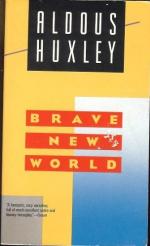|
|
Brave New World Chapter 16
The three meet with his fordship World Controller Mustapha Mond in his study. Bernard is gloomy and pessimistic; Helmholtz is laughing aloud; and the Savage is restlessly pacing. He reads some of Mond's autobiography. Mond walks in and addresses the Savage directly, asking him if he likes civilization. Bernard is horrified when the Savage gives Mond the honest answer of no. During the course of their conversation, Mond makes an allusion to an image from a Shakespeare play, and the Savage lights up with pleasure, until Mond reminds him that only he, the World Controller, who makes the laws, can break them. Mond explains that Shakespeare is prohibited because it is old, and particularly because it is beautiful, and people should be attracted to new things, not old things. They discuss Othello, another Shakespeare play, and Mond explains the impossibility of such a play's existence: to have tragedy you need social instability and dissatisfaction.
"Our world is not the same as Othello's world. You can't make flivvers without steel-and you can't make tragedies without social instability. The world's stable now. People are happy; they get what they want, and they never want what they can't get...And if anything should go wrong, there's soma. Which you go and chuck out of the window in the name of liberty, Mr. Savage. Liberty!... Expecting Deltas to know what liberty is! And now expecting them to understand Othello! My good boy!... Of course [Othello is better than those feelies]. That's the price we have to pay for stability. You've got to choose between happiness and what people used to call high art." Chapter 16, pg. 220
Even Helmholtz, who writes the feelies, agrees that they are idiotic. Mond continues:
"Actual happiness always looks pretty squalid in comparison with the overcompensations for misery. And, of course, stability isn't nearly so spectacular as instability. And being contented has none of the glamour of a good fight against misfortune, none of the picturesqueness of a struggle with temptation or a fatal overthrow by passion or doubt. Happiness is never grand." Chapter 16, pg. 221
Mond stands up for society, defending the Bokanovsky twins. He explains that everyone can't be an Alpha-double-plus; they need morons to do moron work; an Alpha would go mad doing that kind of work. He describes the Cyprus experiment, in which twenty-two thousand Alphas were put on an island. There were strikes and chaos and soon there was a civil war, and the surviving three thousand members begged the government to retake control. Mond tells the Savage that the ultimate population, like an iceberg, has eight-ninths below the water line, and only one-ninth above. Those below like their work. In Ireland they tried instituting a four-hour work day, which only resulted in increased soma use; they took vacations from leisure.
Mond mentions the word science, a term unfamiliar to the Savage. Helmholtz is surprised to hear that Mond considers even some science to be subversive. Mond reveals that he was once a physicist, and came to realize that science is, "just a cookery book, with an orthodox theory of cooking that nobody's allowed to question, and a list of recipes that mustn't be added to except by special permission from the head cook." Chapter 16, pg. 225 He did some unorthodox physics once, and was threatened with being sent to an island. Bernard panics and begs, sobbing, not to be sent to an island. He has to be given soma and taken away.
Topic Tracking: Inferiority 18
The discussion continues without him. The Controller explains that on the island, he would have had the opportunity to do whatever unorthodox science he would have desired, but he chose to aspire to Controller status. He praises science, but adds, "we can't allow science to undo its own good work." Chapter 17, pg. 227
He explains that science must deal only with the most immediate problems, and nothing else. As a result of mass production, Ford changed the emphasis of science from truth and beauty to comfort and happiness. Up until the Nine Year's War, people still practiced traditional science. The Controller, by choosing the path of authority over unorthodoxy, chose to serve happiness. He asks Helmholtz what kind of island he would like, and Helmholtz replies that he would write better if the climate were thoroughly bad. The Controller tells him that he likes his spirit, though officially, he disapproves of it. Helmholtz leaves and goes to check up on Bernard.




